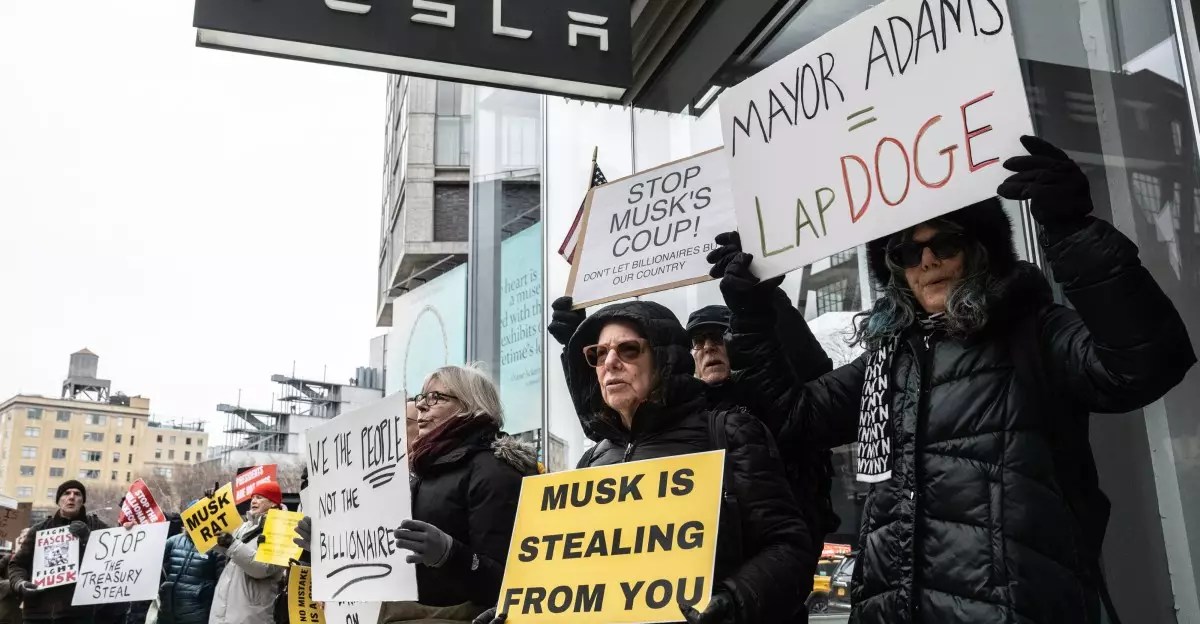The spotlight shone brightly on Tesla this past weekend as protestors assembled outside the electric vehicle manufacturer’s showrooms across the United States. This marks the continuation of an emerging trend since the advent of the “#TeslaTakeover” movement, which gained momentum on platforms like Twitter and Bluesky. The protests primarily call attention to the controversial actions and influence of CEO Elon Musk, particularly during his tenure as the head of the Department of Government Efficiency under Donald Trump’s administration.
While the scale of these protests may not be vast, they are certainly widespread, occurring in various cities from bustling metropolises like New York to smaller locales such as Golden Valley, Minnesota. Organizing efforts through platforms like Action Network reveal that demonstrations are also slated for Ohio, Florida, Washington, New Mexico, and even reaching up to Alberta, Canada. This national movement showcases a growing unease among the public regarding Musk’s political affiliations and their potential repercussions on the perception of Tesla as a brand.
Tesla’s investors are increasingly vocal about their apprehensions regarding Musk’s public persona and political engagements. In statistical terms, the company’s stock has experienced a staggering 21 percent drop since the beginning of Trump’s presidency as reported by prominent news outlets. Inside the corporation, discontent seems to simmer as some employees, including senior level staff, have voiced sentiments suggesting that “the company would be better off if Musk resigned.” These internal dissenters highlight a significant disconnect between Musk’s external actions and overarching corporate wellbeing.
Musk’s associations with controversial political groups, particularly far-right factions, have further fueled the fires of dissent. Observers at one of the more prominent protests in Manhattan noted chants like, “Don’t buy swasticars!” and “Elon Musk can go to Mars; we don’t need your Nazi cars.” Such expressions capture the gravity of public sentiment challenging Musk’s political positions and the broader implications for Tesla’s brand image.
Voices of Dissent
The movement finds its narrative not just in the chants of protestors but also through notable public figures who are lending their voices to the cause. Actor and activist Alex Winter has vocalized his support for the protests, actively encouraging attendees to divest from Tesla vehicles in light of Musk’s political stances. His participation has galvanized many to take a stand, showcasing a burgeoning alliance between celebrity influence and grassroots activism.
While the protests in some cities thrived, participation appeared sporadic in others. For instance, Pittsburgh and Baltimore reported significantly lower turnout numbers, showcasing the uneven nature of public sentiment nation-wide. This variance raises pertinent questions about the longevity and impact of this movement—will these sporadic protests coalesce into a unified front, or will they dissipate with time?
The outpouring of dissent against Musk’s leadership style and political ideologies extends beyond conventional picketing. Musicians like Sheryl Crow have creatively participated in the movement, sharing symbolic gestures through social media. Crow posted a video showing a Tesla being carted away on a flatbed truck, emphasizing the message, “There comes a time when you have to decide who you are willing to align with. So long Tesla.” Such actions correspond to the larger narrative surrounding corporate responsibility in the political landscape.
As we approach the upcoming President’s Day holiday, anticipation grows surrounding additional planned protests. Events are set for cities such as Lowell, Maine, and Richmond, Virginia. These rallies may broaden the scope of dissent beyond Tesla’s direct influence, intertwining Musk’s role in the DOGE cryptocurrency epidemic and his connections to Trump’s administration more broadly.
In essence, the protests occurring across the nation represent more than just an opposition to Tesla or Elon Musk. They signify a societal struggle grappling with corporate influence, ethical leadership, and the intersection of technology and politics. As Tesla navigates this challenging period, only time will tell whether public dissent can reshape the company’s trajectory or if it becomes merely a footnote in the larger narrative of its evolution. Amid the clamor and outcry, one truth remains palpable: consumers are increasingly holding companies accountable for the actions of their leaders in an age where corporate ethics and personal conduct increasingly overlap.


Leave a Reply